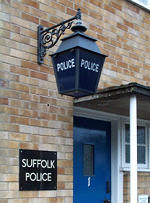 Last week a Portland, Oregon food additive broker learned the hard way that he should have stuck to MSG and not gotten involved in exporting silver-zinc batteries. It seems that the batteries in question are used to power the Hawk missile and were ultimately destined for Iran. So Robert Caldwell was arrested in a luxury hotel in San Antonio after he tried to buy the batteries from an undercover ICE agent on behalf of a U.K. citizen, still at large, who wanted them shipped to Iran by way of the Netherlands.
Last week a Portland, Oregon food additive broker learned the hard way that he should have stuck to MSG and not gotten involved in exporting silver-zinc batteries. It seems that the batteries in question are used to power the Hawk missile and were ultimately destined for Iran. So Robert Caldwell was arrested in a luxury hotel in San Antonio after he tried to buy the batteries from an undercover ICE agent on behalf of a U.K. citizen, still at large, who wanted them shipped to Iran by way of the Netherlands.
A copy of the ICE agent’s affidavit in support of the criminal complaint against Caldwell is interesting reading, not the least because of the ICE agent’s frequent and mistaken reference to the DDTC as “the ODTC.” According to the affidavit, Caldwell was attempting to buy the batteries on behalf of Christopher Tappin, a U.K. citizen and director of Brooklands Overseas Services. Caldwell contacted an undercover agent to arrange for a purchase of Eagle Pilcher Silver Zinc batteries GAP-4328. The agent then sent Caldwell a pro-forma invoice for the batteries indicating that export of the batteries without a DDTC license was prohibited. When Caldwell next spoke with the agent he expressed concern about the export restriction on the pro-forma invoice. Somehow or another (and we can only speculate here), the agent alleviated Caldwell’s concerns, since Caldwell sent to the agent a purchase order for the batteries, inaccurately describing them as “Tideland gap inert non-spillable reserve batteries.” The agent and Caldwell then met in a San Antonio hotel. During that meeting Caldwell gave the agent a check for the batteries, and, instead of the batteries, got a pair of handcuffs instead.
One can’t help but get the impression from the affidavit that Caldwell, more accustomed to dealing with Red Dye No. 6 than missile batteries, may have gotten in over his head and may well have had his well-founded anxieties about the export alleviated by the ICE undercover agent.
Nor is the USML status of the Eagle Picher batteries involved entirely clear. The affidavit claims that the batteries fall under Category IV(h) of the USML and then mistakenly asserts that this makes the batteries “significant military equipment.” Apparently the agent doesn’t know what those asterisks on the USML mean. But I’m not even certain that the batteries are appropriately placed in Category IV(h) which would require that they be specifically designed or modified for military use. If these batteries are still being sold, as they obviously are, they must have other uses than powering the discontinued Hawk missile. Of course, since Eagle-Picher lists its line of Silver Zinc batteries under its line of “defense and space power” products, I would counsel an export license even if the USML status of the batteries isn’t entirely clear.
 Last Friday, OFAC further amended its rules relating to “flag of convenience” ships registered in North Korea. Previously, OFAC had forbidden Americans from owning, leasing, operating or insuring North Korean flagged ships. Under the new rules, Americans may not obtain authorization for a vessel to fly a North Korean flag.
Last Friday, OFAC further amended its rules relating to “flag of convenience” ships registered in North Korea. Previously, OFAC had forbidden Americans from owning, leasing, operating or insuring North Korean flagged ships. Under the new rules, Americans may not obtain authorization for a vessel to fly a North Korean flag. 
 Posted by
Posted by  Category:
Category: 

 Last week a Portland, Oregon food additive broker
Last week a Portland, Oregon food additive broker  Last week we were
Last week we were  Next time you are in the airport, don’t be surprised if some ICE agents, dressed as Viking pillagers, come running after you in the jet-way screaming “What’s in your laptop?” At least that’s a possibility hinted at by BIS Assistant Secretary Darryl Jackson’s
Next time you are in the airport, don’t be surprised if some ICE agents, dressed as Viking pillagers, come running after you in the jet-way screaming “What’s in your laptop?” At least that’s a possibility hinted at by BIS Assistant Secretary Darryl Jackson’s 

